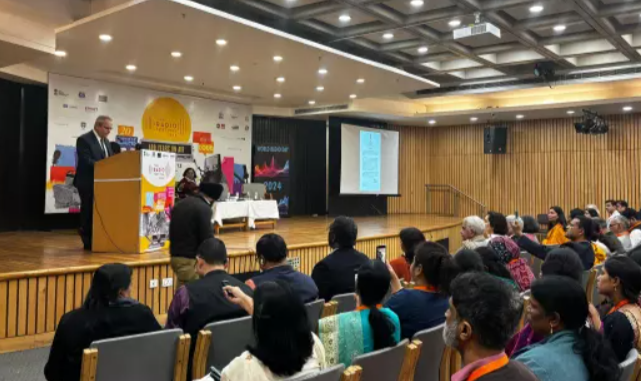
In collaboration with the Ministry of Information and Broadcasting, Prasar Bharti, and Seeking Modern Applications for Real Transformation, UNESCO New Delhi held ‘The Radio Festival’ at the India International Center on 13 February 2024 to celebrate the World Radio Day 2024. This year’s radio festival followed the global theme of “Radio’s remarkable past, relevant present, and promise of a dynamic future.”
The inaugural session consisted of a letter sent in by the President of India, Droupadi Murmu, which highlighted the importance of radios in an ever-changing technological landscape as a conduit of gender equality and a revitalizer of local languages. “The World Radio Day is a celebration of radio in mass communication and in promoting the diversity of culture across the globe. It is an opportunity to emphasize the importance of local languages in communicating with the audience, and to highlight the extraordinary role of women in radio’s journey,” said her message.
The other dignitaries who were in attendance were Sanjay Jaju, Secretary, Ministry of Information and Broadcasting, who, in his inaugural speech, spoke about the importance of The World Radio Day and the paramount role the ‘Radio Festival’ plays in highlighting the relevance of the radio in current times. His speech highlighted the importance of radio, especially as a means of information dissemination at the local level.
Vasudha Gupta, Principal Director General of All India Radio, concurred and added to the importance of the radio as a means of information sharing and sustained that “Akashvani, Vividh Bharati continue to serve the citizens of India in regional languages by sharing pure information, news, regional music and other programs on the radio and nothing can take place of the sound waves.”
Tim Curtis, Director of UNESCO New Delhi, added to the importance of radio in his inaugural speech by commenting on its ever-changing importance in a dynamic technological world.
“Studies show that radio remains popular despite increased challenges such as the popularity of social media. Therefore, it is only reasonable to expect radio to evolve and take advantage of these digital technologies. Its democratic value sets radio apart, and it acts as a grassroot catalyst for bringing communities together,” he said.
The festival had multifarious panels to discuss the different aspects of the radio. Some topics discussed included gender equality and female emancipation in the radio space over the years, the linguistic influence of radio, and the historical relevance and its ever-changing future. The session on the Diversity of Sound, which RJ Nasir moderated, was particularly well received as it discussed the radio as a medium with a diverse array of audiences spanning different geographical, language, and expression. The festival had over 400 attendees, including members from a myriad of community as well as local and national radio stations and experts from the media industry.
World Radio Day is an international UN day that was adopted by the United Nations General Assembly in 2012. 13 February, since then, has become World Radio Day to recognize the importance of the radio as a means of communication and technology and as an enabler for information dissemination and a promoter of human rights.
